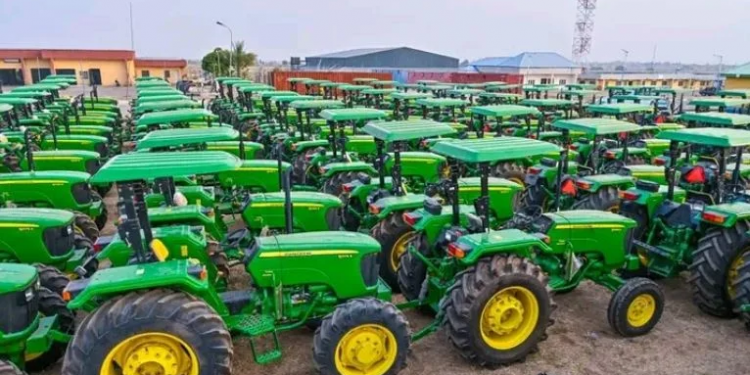The National Agricultural Development Fund (NADF) and Heifer International Nigeria have agreed to deploy 10,000 John Deere tractors over the next five years to drive farming.
Mohammed Abu Ibrahim, executive secretary of NADF, stated this in his remarks at a workshop in Abuja on Tuesday.
He said the workshop was aimed at creating a sustainable framework for a mechanization program because mechanization deficit severely hampers productivity, with many farmers relying on manual or antiquated tools, leading to low yields and slow agricultural modernization.
He reiterated the Fund’s dedication to addressing the mechanization crisis at the event.
Stating that mechanization in Nigeria has become a bit of a challenge, he said: “Our mechanization rates are very low, and this directly impacts our farmers’ yields and broader economic development indices. This program seeks to introduce 2,000 tractors in the pilot phase with the objective of achieving a robust and inclusive implementation plan.”
Ibrahim emphasized the workshop’s role in gathering stakeholder insights to tailor the program to Nigeria’s specific challenges.
“We’ve invited stakeholders to share their experiences, identify pain points, and offer solutions. This collective input will guide us in creating a sustainable and inclusive framework for implementation,” he added.
Outlining the broader vision, Ibrahim said, “This is just one of five mechanization programs planned under the administration of President Bola Ahmed Tinubu. The goal is to radically transform Nigeria’s agricultural landscape, create job opportunities, and foster economic growth through modernized farming practices.”
In his remarks, Lekan Tobe, country director of Heifer International Nigeria, highlighted the necessity of collaboration for successful mechanization.
“Tractors rarely come to mind when we think of agricultural technology, but they are indispensable in enhancing productivity,” he noted.
“The commitment of stakeholders, many of whom are present today, is crucial to realizing this vision. It’s about creating ripple effect —jobs, training, and maintenance opportunities beyond the immediate deployment of tractors.”
They agreed that the pilot phase, involving the deployment of 2,000 tractors, is expected to be completed within six months, with a goal to scale up to 10,000 tractors over five years.
This ambitious initiative, in line with global best practices, has the potential to position Nigeria as a leader in agricultural transformation across Africa.
They also agreed that the partnership between NADF, Heifer International, and other stakeholders represents a beacon of hope for the sector. They believed that with the right investments and collaborations, Nigeria could bridge the mechanization gap, paving the way for a more productive and sustainable agricultural future.
It was stated at the meeting that current statistics reveal Nigeria’s tractor density is a mere 0.27 tractors per 1,000 hectares, drastically below the Food and Agriculture Organization’s (FAO) recommended minimum of 1.5 tractors per 1,000 hectares.










